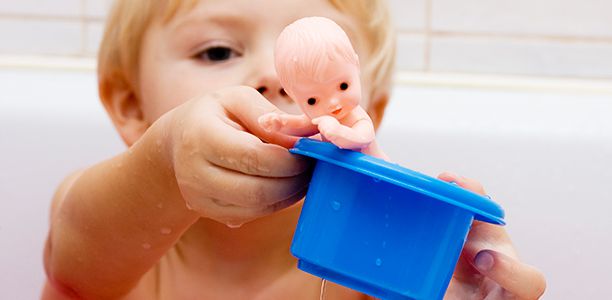Age
1 – 5 years
Duration of activity
Up to 15 minutes
Materials/equipment
- A baby doll- one that ‘urinates’ after your child feeds it a bottle is ideal, but if you don’t have one, any doll with hard plastic hands that can be washed will do.
- Soap, running water and hand washing facilities which are appropriate for your child’s age
Cost
- You should have all the things you need to play this game at home, so you won’t need to spend anything.
Preparation
- Make sure that all the things your child will need to wash the doll’s hands are in easy reach before you start.
What to do
- Start by getting your child to give their doll a drink.
- Take the doll to the toilet. If you have a doll specially designed to go to the potty, use the accessories that came with the doll. If you’re using another doll, use a container as the potty toilet.
- When the doll has finished urinating demonstrate or remind your child to help the doll wipe, using a front to back wiping technique.
- Tell your child not to forget to flush the toilet.
- When the doll has finished toileting, ask your child what they need to do next. They should answer ‘wash the doll’s hands’ but if they’re new to this game you might need to remind them.
- Get your child to wash the doll’s hands with soap and water, according to the proper hand washing technique. Talk to them about hand washing and why it’s important as you go, for example saying things like, “and the soap helps wash the germs off dolly’s hands.” Give them instructions to help them wash the doll’s hands properly. Don’t forget they should dry the doll’s hands with a paper towel when they finish.
- Congratulate your child when they finish, for being a good mum or dad and looking after their baby doll.
Extension activities
- Turn this activity into a role play. Your child is the mother or father of the doll. You speak for the doll while your child talks to it during the hand washing. You could ask questions like, “Why do I need to wash my hands?” or create challenges for your child by saying things like, ‘no, I don’t want to wash my hands today.”
- If your child is a bit older and has a younger sibling, they could play this game by helping their younger sibling wash their hands after going to the toilet.
- If their younger sibling is a baby, get them to help wash baby’s hands after a nappy change or before eating.
Tips
- You might like to count to twenty as your child lathers the doll’s hands with soap- this will help them remember how long they should rub the soap for.
- You could also sing hand washing songs to make this activity even more fun. Songs are also a good way to give your child a sense of how long they need to wash their hands for.
- If you use a hand washing star chart to encourage your child to wash their hands, you could make a separate chart for Dolly.
Safety
- Always supervise your child when they’re in the bathroom.
Educational outcomes
Awareness of health and well being
Healthy habits make healthy bodies and developing an awareness of what makes a person healthy is an important foundation for a healthy life. Teaching your child why hand washing is important, and encouraging them to wash their hands promotes awareness of health. Even when children are too young to care for themselves, they may show their awareness of health and the need for healthy habits, for example by standing by the sink or telling you that they need to wash their hands.
Self care
Being able to care for one’s own health, for example protect from infection by washing the hands, is also an important step in early childhood development. Young children depend on their parents a lot, but they take pride in being able to care for themselves, and learn about the importance of doing so. By about three years of age children can usually wash their hands independently. Before then, providing them opportunities to participate in self-care is an important way to encourage them to do it independently.
Care for others
Showing empathy and caring towards others is an important component of the social and emotional skills children should develop in early childhood. Role playing with a doll or a baby brother or sister is a great opportunity for children to demonstrate their ability to care for others. Caring and empathy are important emotions which will help your child develop positive social behaviours (e.g. the ability to play peacefully with other children) and understand the different expectation placed on people (e.g. mums and dads) in different situations.
Providing opportunities for your older child to play the responsible big brother or sister is also a great way to deal with sibling rivalry, when an older child feels jealous of a younger sibling and starts behaving badly to get more parental attention. For example, if your pre-schooler is showing jealousy towards your newborn (this combination of ages is often the source of the most intense sibling rivalry) let them show how grown up they are by washing baby’s hands. Compliment your pre-schooler so that they know that they can catch your attention with good behaviour.
Social skills
Playing mums and dads is a great way for kids to learn about families and the different roles parents and children play. This activity will help younger children develop a sense of the interdependence between members of a family. They’ll also be learning how to express their emotions and the importance of caring for others.
Communication skills
As your child talks their doll through the hand washing process and talks to you about it, they’re practising communicating. For example they will learn:
- The importance of providing information and instructions.
- How and when to ask questions.
- How to take turns during a conversation.
Fine motor skills
Your child will also be developing their finger muscles as they perform fiddly tasks like manipulating a slippery bar of soap and drying Dolly’s hands.

More information about hand washing games and activities.
References
- National Childcare Accreditation Council Inc. Supporting children’s hygiene skills. 2009. (cited 24 August 2013). Available from: (URL Link)
- Virginia Early Childhood Development Alignment Program. Milestones of child development- A guide to young children’s learning and development from birth to kindergarten. 2009. (cited 26 July 2013). Available from: (URL Link)
- Shelov SP, Remer T. Caring for your baby and young child- Birth to age 5- The complete and authoritative guide. American Academy of Pediatrics. 2009. Bantom Books. Available from: (URL Link)



 (6 votes, average: 4.33 out of 5)
(6 votes, average: 4.33 out of 5) 






